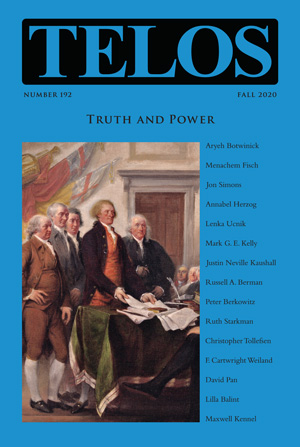In today’s episode of the Telos Press Podcast, Camelia Raghinaru talks with Aryeh Botwinick about his article “Negative Theology, Power, and the Israeli–Palestinian Conflict,” from Telos 192 (Fall 2020). An excerpt of the article appears here. If your university has an online subscription to Telos, you can read the full article at the Telos Online website. For non-subscribers, learn how your university can begin a subscription to Telos at our library recommendation page. Purchase a print copy of Telos 192 in our online store.
|
In today’s episode of the Telos Press Podcast, Camelia Raghinaru talks with Menachem Fisch about his article “The Tragic Paradox of Political Zionism,” from Telos 192 (Fall 2020). An excerpt of the article appears here. If your university has an online subscription to Telos, you can read the full article at the Telos Online website. For non-subscribers, learn how your university can begin a subscription to Telos at our library recommendation page. Purchase a print copy of Telos 192 in our online store. Jon Simons’s “Divine Violence, Profane Peace: Walter Benjamin, Rabbis for Human Rights, and Peace in Israel–Palestine” appears in Telos 192 (Fall 2020): Truth and Power. Read the full article at the Telos Online website, or purchase a print copy of the issue in our online store. Individual subscriptions to Telos are available in both print and online formats. Dafna Zur’s “You Can’t Write ‘Pak’ on Television: Language as Power in Hebrew K-pop Fandom” appears in Telos 184 (Fall 2018), a special issue on Korea. Read the full article at the Telos Online website, or purchase a print copy of the issue in our online store. Individual subscriptions to Telos are available in both print and online formats. Korean popular culture first arrived in Israel with the airing of Sweet Samsoon in 2007. What began as a cable channel’s cautious experiment with the tastes of a fan base accustomed to South American telenovelas turned into an unpredictably successful venture. Korean dramas have since appeared regularly both on cable TV and through fansub sites, delivering romantic comedies, action-packed adventures, and historical dramas to their fans. The reception of Korean pop culture in Israel challenges a traditional understanding of its reception around the world since Israel falls neither within the region that has facilitated Korean pop culture’s transnational circulation, nor have Israel and Korea enjoyed an extended political or economic exchange that would facilitate the reception of Korean cultural products. Cary Nelson and Telos editor, Russell Berman, respond to Saree Makdisi and raise broader questions about the contemporary humanities. Read their essay at Fathom. The large room at the Marriott Wardman Park was filled to overflowing on Sunday afternoon for a special session billed as “Thinking Palestine Intersectionally.” The seats were occupied and scores of others stood along the walls, sat on the floor in front of the stage, and spilled out into the hallway. For many it was clearly the highlight of The Middle East Studies Association’s November 2017 annual meeting of faculty and graduate students, held in Washington, DC. Perhaps 500 people were present to hear Noura Erakat, Judith Butler, Samera Esmeir, and Angela Davis be hailed as symbolic conquerors of the Jewish state. “The peace process is over,” Erakat began, and then affirmed “the entwinement of our liberation,” offering her own take on intersectionality. The real reason the United States blocked the “Zionism is racism” framework, she declared was “to prevent itself from having to pay reparations for slavery,” a claim that would have surprised the very people who fought against the 1975 UN resolution. The days of progressive advocacy “except for Palestine are over,” she concluded. It is time “to bar supporters of Israel from feminist movements.” Even this last agenda item, a call to cast out the female devils in our midst, met with loud applause. |
||||
|
Telos Press Publishing · PO Box 811 · Candor, NY 13743 · Phone: 212-228-6479 Privacy Policy · Data Protection Copyright © 2025 Telos Press Publishing · All Rights Reserved |
||||



